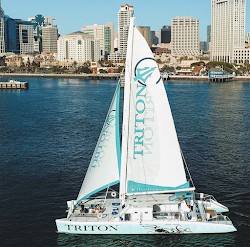Founded 77 years ago by Emanuel Bronner in the heart of San Diego, Dr. Bronner's has grown from a countercultural staple to a brand synonymous with progressive values, including sustainability and social justice. The company, which now sees annual revenues in the ballpark of $200 million, has remained deeply rooted in San Diego, where it continues its operations from its Vista base.
In recent years, under the leadership of current CEO David Bronner, affectionately known as the "Cosmic Engagement Officer," the company has expanded its commitment to progressive, yet sometimes controversial, causes, notably in the realm of psychedelics. Since 2019, Dr. Bronner’s has donated over $14 million to research and reform efforts related to psychedelic substances, reflecting a belief in their medicinal and spiritual benefits. The company's social media channels are also brimming with content that highlights the therapeutic and spiritual benefits of various hallucinogens, including psilocybin, ketamine, and MDMA, commonly known as ecstasy.
In recent years, under the leadership of current CEO David Bronner, affectionately known as the "Cosmic Engagement Officer," the company has expanded its commitment to progressive, yet sometimes controversial, causes, notably in the realm of psychedelics. Since 2019, Dr. Bronner’s has donated over $14 million to research and reform efforts related to psychedelic substances, reflecting a belief in their medicinal and spiritual benefits. The company's social media channels are also brimming with content that highlights the therapeutic and spiritual benefits of various hallucinogens, including psilocybin, ketamine, and MDMA, commonly known as ecstasy.
The family of former Dr. Bronner's employee, Denise Lozano, has filed a lawsuit which claims that the company fostered a culture of drug use which contributed to Lozano's overdose death in 2022. The lawsuit, Estate of Denise Lozano v. Allbert et al, which was filed in San Diego County Superior Court on December 9, 2024, states that Dr. Bronner's promotion of psychedelics has led to an unregulated culture of drug use among its leaders and staff, particularly within the events and experience division, known internally as the "Foamy Homies." This team, famous for their presence at events like Burning Man, is alleged to have used psychedelics regularly to enhance their "mission and experience."
Denise Lozano, who worked with this division, suffered a back injury while on duty. According to the lawsuit, David Bronner and his wife Mia, who manages the events team and are named defendants in the lawsuit, arranged for Lozano to receive what was described as a "ketamine massage" from an allegedly unlicensed practitioner named Christian Allbert. This massage, intended to alleviate her pain, allegedly resulted in Lozano receiving a lethal dose of MDA, leading to her untimely death.
The incident has raised significant questions about the oversight and safety of such practices within the company, particularly given Dr. Bronner’s official stance on regulated ketamine-assisted therapy through its health benefits package. This therapy is managed by Enthea, ensuring medical and psychiatric support, starkly contrasting with the allegations of unlicensed drug administration.
David and Mia Bronner, through a company spokesperson, have expressed deep sorrow over Lozano’s passing, emphasizing that it was not the fault of anyone associated with Dr. Bronner’s and describing Lozano as a beloved member of their community. However, they have declined further interviews due to the ongoing litigation.
The lawsuit underscores a clash between the company's public advocacy for psychedelic benefits and the internal practices that allegedly led to tragedy. It has sparked a broader discussion on the responsibilities of companies promoting alternative therapies and the fine line between healing and harm in unregulated settings.
As this legal battle unfolds in the San Diego County Superior Court, it not only challenges Dr. Bronner’s practices but also its reputation as a community and health-focused business built on the ideals of unity and well-being. The outcome could potentially influence how other companies in San Diego and beyond reproach or regulate the use of psychedelics in corporate culture.
Originally published on February 6, 2025.






















